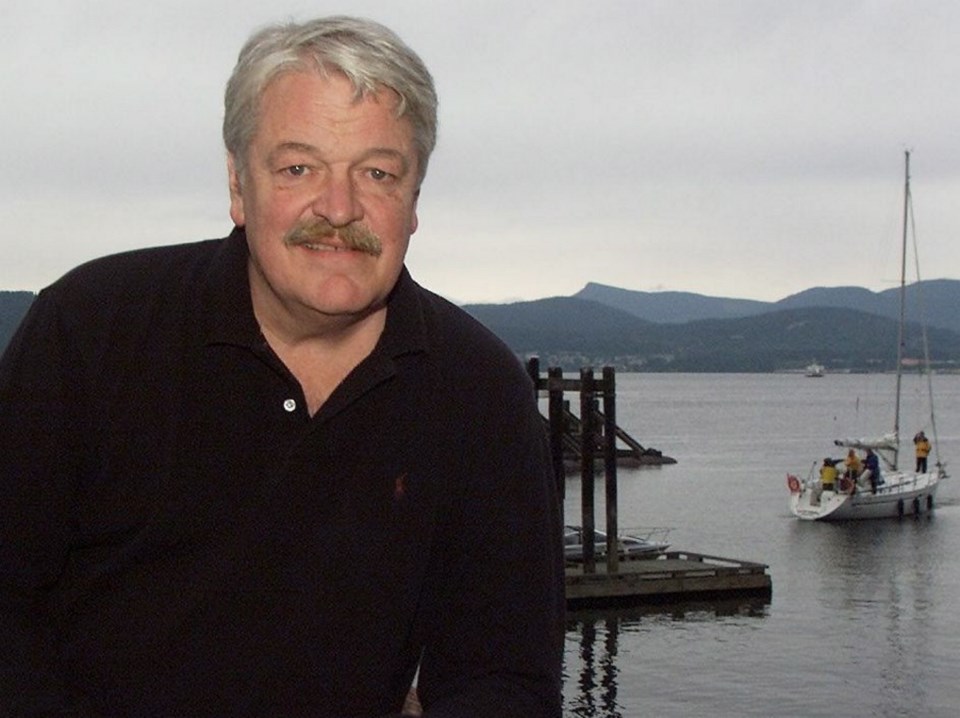Futurist, developer, author and history scholar, former Social Credit cabinet minister and Victoria alderman Sam Bawlf has died at the age of 72.
Many of downtown Victoria’s most important historic buildings were restored and renovated by Bawlf, an early leader in preserving the city’s architectural heritage.
His work went beyond saving old buildings. It was more about “having an economic strategy” to do it, said Martin Segger, a former Victoria councillor and former head of the Maltwood Art Museum and Gallery.
Bawlf reflected on his life recently when Segger travelled to Salt Spring Island to create a two-hour videotape, now in the library at the University of Victoria.
“We can all grow to appreciate old buildings and their heritage value, but how do you translate that into conservation for posterity? That was, in a way, the core of the message in the tape that he made,” Segger said.
Born June 7, 1944, in Winnipeg, Bawlf grew up in Vancouver, where he studied urban planning at the University of B.C. He was among a group of visionaries in UBC’s geography and planning departments in the 1960s, Segger said. “They were really tuned in to where the province needed to go.”
Bawlf dazzled Victoria with his vision. In 1972, he predicted that people would buy their groceries via cablevision. He said that downtown traffic would disappear as motorists left vehicles in park-and-ride locations to bus to work. He lamented the seasonal tourism industry in Victoria, saying it could be a year-round revenue generator.
He is also credited with pitching the idea of celebrating Vancouver’s centennial with Expo 86 to B.C.’s cabinet. His view was that B.C. needed to be seen around the world, Segger said.
In 1972 Bawlf ran successfully for alderman in Victoria and in 1975 ran in the provincial election for the Socreds, winning his Victoria seat as well as a place in Premier Bill Bennett’s cabinet as minister of conservation and recreation. As minister, Bawlf oversaw the enactment of B.C.’s first heritage conservation act.
Norman Ruff, UVic associate professor emeritus in political science, said Bawlf, who was appointed minister of deregulation, was an MLA at a “critical time in B.C. politics — the revival of the Social Credit.”
Bawlf lost his seat in 1979 and went back into business, working on historical restoration projects and serving as an international consultant on the revival of historic places.
He spearheaded the Victoria Accord planning project in the Humboldt Valley and around the legislature. Segger said Bawlf was pleased to see that the mixed-use Capital Park development behind the legislature was underway.
Bawlf also founded the B.C. Heritage Trust, said Segger, who served on the trust’s board for many years.
“The trust funnelled literally millions of dollars into heritage conservation throughout B.C. in partnership with municipalities.”
Although the trust was disbanded a few years ago, “heritage conservation is rooted throughout the province at the community level. That is really his vision,” Segger said.
Bawlf’s company, Fort Victoria Properties, accumulated 14 properties by the time he sold it in 1976. He is renowned for restoring Market Square with architect brother Nicholas Bawlf.
A believer in what he called “architectural recycling,” Bawlf also restored the Law Chambers in Bastion Square, the Counting House complex, and the Belmont Building.
The Bawlf brothers were honoured by Heritage Canada in 2007 for their restoration work.
Bawlf served in the late 1970s as chairman of the board for B.C. Ferries. In 1994, the long-time advocate of B.C.-built catamarans was hired to advise the B.C. NDP government on fast-ferries technology.
He left the project in 1996, later lambasting the design of the ill-fated PacifiCats ferries, saying they should have been smaller and lighter. The project was poorly planned and spending was uncontrolled, he said.
Bawlf, who lived on Salt Spring Island for 28 years, spent years focused on his controversial theory that British explorer Sir Francis Drake was the first European to set eyes on what would become British Columbia, sometime before 1580.
He worked full time on his book The Secret Journey of Sir Francis Drake, for three years, but had been researching his theories for years prior to that, said his wife.
“He knew quite a few people at the museums in London, he visited royalty in Spain,” she said. “He was a driven man, meticulous.”
The book, published in 2003, has sold more than 20,000 copies and still sells about a thousand copies a year, said his publisher. Bawlf was hoping to publish a followup book.
“He felt that B.C. should jump on this, and acclaim Drake as the founder of modern British Columbia and one of the discoverers of Canada, and weave it into our provincial and national self-image,” said Howard White, publisher of Douglas & McIntyre.
Bawlf had surgery for bladder and prostate cancer two years ago, his wife said. Tests last month revealed that cancer had returned. He was admitted to Salt Spring’s Lady Minto Hospital about a week and a half before his death.
He is survived by his wife, children Chauney and Natasha, and granddaughter Hailey. Bawlf’s family is respecting his wish that no memorial service be held.
Marnie Bawlf said her husband donated his papers on Drake to the UVic library.
— With files from the Vancouver Sun



